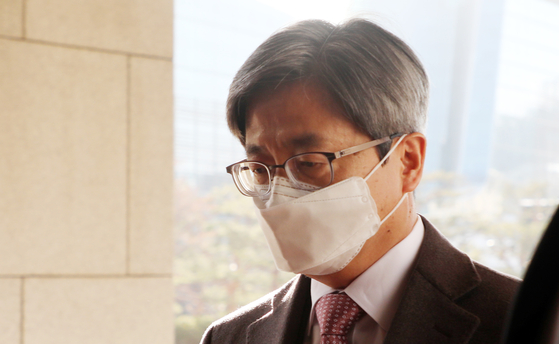![Supreme Court Chief Kim Myung-soo goes to work in Seocho-gu Supreme Court on the morning of the 17th. [연합뉴스]](https://i0.wp.com/pds.joins.com/news/component/htmlphoto_mmdata/202102/17/b0eae6cb-2958-4598-9026-b0e1f254d114.jpg?w=560&ssl=1)
Supreme Court Chief Kim Myung-soo goes to work in Seocho-gu Supreme Court on the morning of the 17th. [연합뉴스]
The incumbent vice-president judge wrote on the court’s internal bulletin board, “It is understandable that Supreme Court Chief Justice Kim Myung-soo’s resignation is raised, but the situation after the resignation should be considered.”
On the afternoon of the afternoon of the 16th, Judge Kim Dong-jin (52, 25th Judicial Research and Training Institute), head of the Seoul Southern District Court, posted an article of 6 pages of A4 paper on the court’s internal bulletin board’Courtnet’ under the title “Opinion on the discussion of the resignation of Supreme Court Chief Kim Myung-soo”.
Two years later, why did only Lim Seong-geun pick up the cock?

Kim Dong-jin, Deputy Judge, Seoul Southern District Court.
He diagnosed that the current Korean society is falling into a’swamp of political power struggle’. The ruling party’s late approval of the impeachment prosecution of the Busan High Court Chief Justice Seong-geun Lim, and the opposition party’s criminal prosecution against Chief Justice Kim, is also part of the political struggle.
Deputy Judge Kim criticized the situation at the time when the prosecution announced the 14 judges involved after investigating allegations of abuse of judicial administration in 2018. “At the time, the National Assembly did not investigate the truth and did not proceed with impeachment proceedings at all.” He asked, “Why did Inje come to Inje, only one out of 14, Chief Judge Im Seong-geun, decided on the impeachment bill and let the judgment proceed?” He also criticized, “The essence of the impeachment procedure is to exclude public officials from performing their duties, and whether it is in line with the nature of the impeachment system prescribed by the Constitution that the urgent resolution of the impeachment bill to Judge Im, whose term is scheduled to expire at the end of this month, is in line with the constitution.” At the same time, referring to the law that “delayed justice is not justice,” it is difficult to say that the impeachment prosecution, which was invoked after two years passed and a politically subtle situation unfolded, was in no way oriented toward the constitutional values of’legalism’ and’judicial independence’. I said.
They also criticized the opposition party’s accusation of Chief Justice Kim. It is argued that the reason for the criminal prosecution beyond the request for resignation was taking into account the political situation ahead of the by-election of local government heads in Seoul and Busan. Deputy Judge Kim said, “It is difficult to see that the opposition party’s accusation against the incumbent Supreme Court is also aimed at the constitutional value of independence of jurisdiction.”
Lies are a problem, consider after resignation
He argued that it is necessary to think on a different level as to whether Supreme Court Chief Kim’s’resignation’ is desirable. Deputy Judge Kim wrote, “The fact that the head of the judiciary has lied to the National Assembly and the people is a very serious problem, and it is not unreasonable that there is a discussion about the resignation of the Supreme Court from all walks of life.”
However, he was concerned that the resignation of the Chief Justice of the Supreme Court could not produce desirable results in that it could lead to the reinforcement of the status and powers of the’Judicial Administrative Committee’ or the’Judicial Council’.
The judicial council or judicial administrative committee is an organization for judicial reform proposed by the National Assembly after allegations of abuse of judicial administration authority. The amendment to the Court Organization Act initiated by Democratic Party lawmaker Lee Tan-hee last year included the transfer of the overall judicial administration authority from the Chief Justice of the Supreme Court to the Judicial Administration Committee. In particular, 8 external members out of 12 members, and they were allowed to participate in the deliberation of judges. At the time, the Supreme Court commented on the bill that it is “unconstitutional and should be considered extremely carefully.” The Supreme Court, which raised the issue of “two-thirds of outsiders,” refuted that “the judicial administration is closely related to judicial independence and should not be influenced by the influence and influence of politics.”
Deputy Judge Kim asked, “Would you be able to agree if the politics and some organizations legislated the expansion of the judicial administrative committee or judicial council’s authority after the resignation of Supreme Court, and these bodies play a substantial role in the main personnel rights of judges?” did.
Judge Kim, who began his career as a judge of the Suwon District Law in 1999, has often revealed his opinions on cases that have been socially controversial on Courtnet and personal SNS. In September 2014, there was controversy over the first trial ruling by Won Se-hoon, who did not admit charges of violating the Public Official Election Act, as “Jirok Wima’s ruling”. In addition, in February of last year, he wrote and deleted an article on his Facebook page stating “President Jae-in Moon should be shy.”
Reporter Lee Sujeong [email protected]
